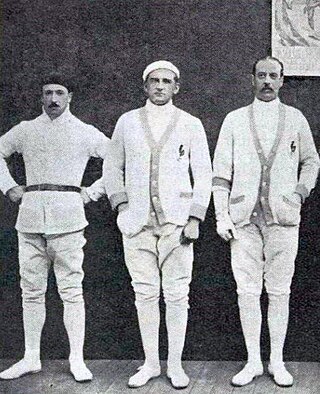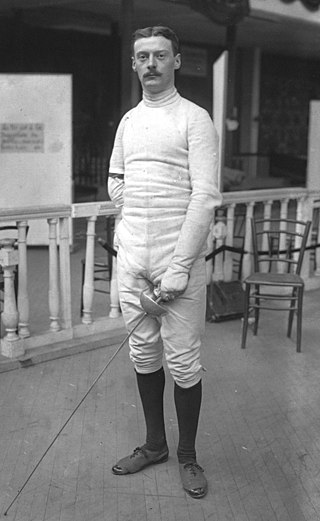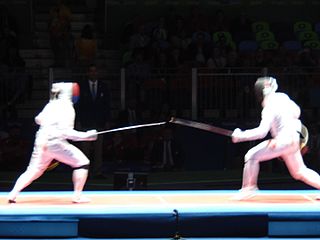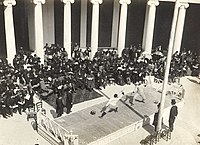
The 1896 Summer Olympics, officially known as the Games of the I Olympiad and commonly known as Athens 1896, were the first international Olympic Games held in modern history. Organised by the International Olympic Committee (IOC), which had been created by French aristocrat Pierre de Coubertin, the event was held in Athens, Greece, from 6 to 15 April 1896.

The men's foil was one of three fencing events on the Fencing at the 1896 Summer Olympics programme. It was held on the second day of competition, 7 April. Eight fencers took part, with the preliminary fencing involving a round-robin held in two groups. The first group was Pierrakos-Mavromichalis, Delaborde, Callot, and Poulos. The second was Komninos-Miliotis, Balakakis, Gravelotte, and Vouros. The two fencers that were undefeated in their groups faced each other in the final for gold and silver medals, while Pierrakos-Mavromichalis and Vouros were awarded third place. Vouros's second win came from a forfeit by Komninos-Miliotis.

The men's sabre was one of three fencing events on the Fencing at the 1896 Summer Olympics programme. It was held on 9 April, the fourth day of competition. The event was won by Ioannis Georgiadis of Greece, with his countryman Telemachos Karakalos. Holger Nielsen of Denmark finished third.

The Egyptian Olympic Committee considers the nation to have first competed in the Summer Olympic Games at the 1912 Summer Olympics in Stockholm, Sweden. According to the official report, the nation sent one fencer, Ahmed Hassanein, who competed in the individual foil and épée events. There is uncertainty, however, as to whether he competed, as the official report lists all entrants in fencing regardless of their actual participation, and no results are known for Hassanein.

The men's épée was one of eight fencing events on the fencing at the 1964 Summer Olympics programme. It was the fourteenth appearance of the event. The competition was held from October 18 to 19 1964. 65 fencers from 25 nations competed. Each nation was limited to three fencers. The event was won by Grigory Kriss of the Soviet Union, the nation's first gold medal in the event after a bronze four years earlier. The Soviets also took bronze, with Guram Kostava finishing in third place. Between the two was silver medalist Bill Hoskyns of Great Britain; it was the second consecutive Games with a British silver medalist in the event. Italy's six-Games gold medal streak in the men's individual épée ended with the nation missing the podium entirely; Gianluigi Saccaro finished fourth after losing the bronze-medal barrage to Kostava.

The men's épée was a fencing event held as part of the fencing programme at the 1904 Summer Olympics. It was the second time the event was held at the Olympics. 5 fencers from 3 nations competed. The competition was held on September 7, 1904. The event was won by Ramón Fonst of Cuba, repeating as Olympic champion in the individual épée. The silver medal went to Charles Tatham and the bronze to Albertson Van Zo Post. Tatham and Van Zo Post were both Americans, but the International Olympic Committee's results page showed them as Cuban for more than a century until it was finally corrected in the early 2020s.

The men's épée was a competition in fencing at the 2004 Summer Olympics in Athens. A total of 37 men from 21 nations competed in this event. Each nation was limited to 3 fencers. Competition took place in the Fencing Hall at the Helliniko Olympic Complex on August 17. The event was won by Marcel Fischer of Switzerland, the nation's first victory in the event and first medal of any color since 1952. Wang Lei's silver was China's first medal in the men's individual épée. Defending champion Pavel Kolobkov earned bronze, finishing a set of three different-colored Olympic medals in the event. Kolobkov was the fourth man to earn three medals in the event and had the best record of any of the four; only Ramón Fonst had more individual Olympic success in the men's épée. It was the fifth consecutive Games in which a Russian fencer reached the podium, including medals for Russian fencers competing for the Soviet Union (1988) and Unified Team (1992).

The men's foil was a competition in fencing at the 2004 Summer Olympics in Athens. A total of 36 men from 20 nations competed in this event. Nations had been limited to three fencers each since 1928. Competition took place in the Fencing Hall at the Helliniko Olympic Complex on August 16. The event was won by Brice Guyart of France, the nation's ninth victory in the men's foil. Italy took the other two medals, with Salvatore Sanzo earning silver and Andrea Cassarà winning the bronze medal match.

The men's sabre was a competition in fencing at the 2004 Summer Olympics in Athens. A total of 39 men from 21 nations competed in this event. Nations had been limited to three fencers each since 1928. Competition took place in the Fencing Hall at the Helliniko Olympic Complex on August 14. The event was won by Aldo Montano of Italy, the nation's first victory in the men's sabre since 1920. Montano accomplished what his grandfather and father, both world champions in the individual event and Olympic medalists in the team competition, had not been able to: Olympic gold in the individual event. Zsolt Nemcsik of Hungary took silver while Vladislav Tretiak earned Ukraine's first medal in the event with his bronze. France's five-Games medal streak ended.

The men's épée was a fencing event held as part of the fencing at the 1920 Summer Olympics programme. It was the fifth appearance of the event. A total of 80 fencers from 13 nations competed in the event, which was held from August 20 to 23, 1920. Each nation was limited to eight fencers, down from 12 in 1908 and 1912. Of the six fencing events, the only one in which Nedo Nadi did not win a gold medal was the one in which he did not compete. Instead, a trio of Frenchmen swept the medals. It was Lippmann's second silver medal in the event, he having previously taken second in 1908; he was the second man to win multiple medals in the individual épée.

The men's foil fencing competition at the 2008 Summer Olympics in Beijing took place on August 13 at the Olympic Green Convention Centre. There were 26 competitors from 21 nations. The event was won by Benjamin Kleibrink of Germany, the nation's first victory in the men's foil. Yuki Ota's silver was Japan's first medal in the event. Salvatore Sanzo of Italy took bronze, becoming the 10th man to win multiple medals in the event.

The men's foil was one of seven fencing events on the Fencing at the 1924 Summer Olympics programme. It was the sixth appearance of the event, which had not been on the programme in 1908. The competition was held from Monday July 1, 1924, to Thursday July 4, 1924. 49 fencers from 17 nations competed. Nations were limited to four fencers each, down from eight in 1920. The event was won by Roger Ducret of France, the nation's third victory in the men's foil. His countryman Philippe Cattiau finished second for the second consecutive Games; Cattiau and Ducret became the second and third men to win multiple medals in the event. Maurice Van Damme earned Belgium's first medal in the men's foil with his bronze.

The men's épée was one of seven fencing events on the Fencing at the 1928 Summer Olympics programme. It was the seventh appearance of the event. The competition was held from 6 August 1928 to 7 August 1928. 59 fencers from 22 nations competed. Each nation could have up to three fencers. The event was won by Lucien Gaudin of France, the nation's third victory in the individual men's épée—taking sole possession of most among nations above Cuba and Belgium, each at two. Gaudin was the second man to win both the foil and épée events at a single Games. It was the third consecutive Games at which France reached the podium in the event. Two Frenchman had reached the head-to-head final; Gaudin won over Georges Buchard, who received silver. Bronze in 1928 went to American George Calnan, the nation's first medal in the event.

The men's foil was one of seven fencing events on the Fencing at the 1928 Summer Olympics programme. It was the seventh appearance of the event. The competition was held from 31 July 1928 to 1 August 1928. 54 fencers from 22 nations competed. For the third straight Games, the limit of fencers per nation was reduced. The event was won by Lucien Gaudin of France, the nation's second consecutive and fourth overall victory in the men's foil. Erwin Casmir earned silver to give Germany its first medal in the event. Giulio Gaudini of Italy took bronze.

The men's foil was one of seven fencing events on the fencing at the 1932 Summer Olympics programme. It was the eighth appearance of the event. The competition was held from 2 to 4 August 1932. 26 fencers from 12 nations competed, with one other entered but not starting. Each nation was limited to three fencers. The event was won by Gustavo Marzi of Italy, the nation's third victory in the men's foil. His countryman Giulio Gaudini took bronze for the second consecutive Games, becoming the fourth man to win multiple medals in the event. Joe Levis gave the United States its first men's foil medal with his silver.

The men's épée was one of ten fencing events on the fencing at the 1996 Summer Olympics programme. It was the twenty-second appearance of the event. The competition was held on 20 July 1996. 45 fencers from 21 nations competed, a sharply reduced number from prior Games which generally had 60 to 80 fencers. Each nation remained limited to 3 fencers in the event. The event was won by Aleksandr Beketov of Russia, the nation's first victory and first medal in the event in its debut. Iván Trevejo's silver was Cuba's first medal in the event since Ramón Fonst won the first two gold medals in 1900 and 1904. The bronze went to Géza Imre of Hungary, that nation's first medal in the men's individual épée since 1980. France's four-Games podium streak ended.

The men's foil was one of ten fencing events on the fencing at the 1996 Summer Olympics programme. It was the twenty-second appearance of the event. The competition was held on 22 July 1996. 45 fencers from 19 nations competed. Nations had been limited to three fencers each since 1928. The event was won by Alessandro Puccini of Italy, the nation's eighth victory in the men's foil. France took the other two medals, with Lionel Plumenail earning silver and Franck Boidin winning the bronze medal match.

The men's foil was one of ten fencing events on the fencing at the 2000 Summer Olympics programme. It was the twenty-third appearance of the event. The competition was held on 20 September 2000. 40 fencers from 22 nations competed. Nations had been limited to three fencers each since 1928. The event was won by Kim Yeong-Ho of South Korea, the first Asian man to win an Olympic fencing title. Ralf Bißdorf of Germany took silver, the first medal for united Germany since 1928. Dmitry Shevchenko's bronze medal was Russia's first as an independent nation in the event.

The men's épée competition in fencing at the 2016 Summer Olympics in Rio de Janeiro was held on 9 August at the Carioca Arena 3. There were 38 competitors from 20 nations. South Korea's Park Sang-young won the individual gold, the first victory for South Korea in the event after bronze medals in 2000 and 2012. Géza Imre took silver, Hungary's first medal in the event since 1996. Imre, at age 41, was the oldest individual fencing medalist since 1952. Gauthier Grumier of France earned bronze.

The men's épée event at the 2020 Summer Olympics took place on 25 July 2021 at the Makuhari Messe. 36 fencers from 18 nations competed.






















